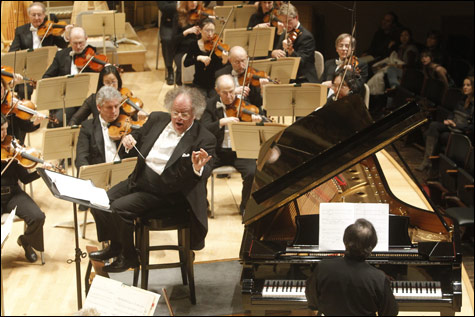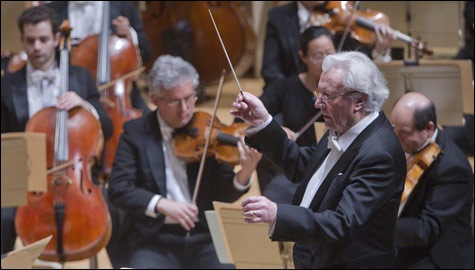
LEFT AND RIGHT In Ravel’s Piano Concerto for the Left Hand, BSO music director James Levine (left) and soloist Pierre-Laurent Aimard (at the piano) were just right. |
BSO music director James Levine has returned to Symphony Hall for the first time since October, when back surgery put him out of commission. He made a brilliant appearance in December conducting the Metropolitan Opera's Les contes d'Hoffmann. And this past weekend's BSO concert confirmed his recovery. His ambitious if mostly familiar program (which he reprised at Carnegie Hall on Monday) was charged with his accustomed insight and energy, and no trace of fatigue.
He started with a piece new to him, Elliott Carter's aptly named Dialogues, a shifting 14-minute single-movement mini-concerto for piano and orchestra from 2003 (when Carter was a youthful 93). Pierre-Laurent Aimard revealed more varied character and moment-to-moment expressiveness (fast-talking/halting/assertive/regressive) than I've heard before in this piece, and the colorful orchestra — aggressive, conciliatory, sly, witty — was a full partner in the engaging conversation/argument.
In 2008, Levine led BSO principal violist Steven Ansell in Berlioz's concerto-like symphonic narrative inspired by Byron, Harold in Italy. This time Ansell was more Byronic, he and the orchestra playing with even greater urgency. The great tunes not only washed over you, they swept you away with them. The dark opening orchestral fugue had the weight of Bach. Aimard then returned for an exhilarating and nuanced Piano Concerto for the Left Hand, which Ravel composed in 1930 for Paul Wittgenstein (philosopher Ludwig's older brother, who lost his right arm in World War I). The ominous orchestral opening — low strings and contrabassoon — heaved onto the horizon like a warship, and the single left hand sounded like an entire orchestra. The evening ended with Ravel's Daphnis and Chloe Suite No. 2, which erupted like an orgasmic volcano. (Levine's complete Daphnis with the BSO just won the Grammy for Best Orchestral Performance.)

BIRTHDAY PRESENT Sir Colin Davis led James MacMillan’s St. John Passion, which was copmpsed for the conductor’s 80th. |
The week before, Sir Colin Davis led the American premiere of the prolific Scottish Roman Catholic composer James MacMillan's St. John Passion, a piece composed in 2007 for Sir Colin's 80th birthday and co-commissioned by the BSO. Does human history have a more powerful story than the last days of Jesus? Two of Bach's greatest works, the St. Matthew Passion and the St. John Passion, retell that intense human and spiritual drama. In our time, the St. John is more troubling, because its theological politics place the blame for Jesus's death on Jews. Despite the humanizing influence of Bach's music, sophisticated modern audiences still have trouble with his setting. For a contemporary composer, it's even trickier, and MacMillan complicates the problem by adding the anti-Semitic "Reproaches" from the Good Friday Mass, a passage, offensive to many Jews, that the Church has tried to explain away by suggesting that the "Jews" who are the object of Jesus's anger are only a metaphor, and that his anger is really directed at the Christian congregation.